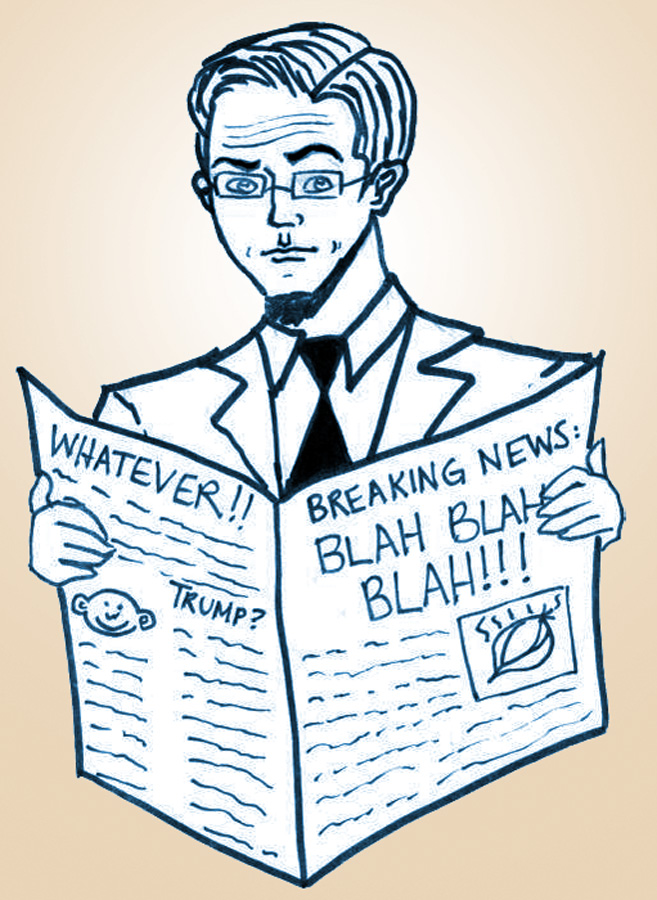
“America Again: Re-Becoming the Greatness We Never Weren’t” has swept through bookstores across the nation. The book, written by satirist Stephen Colbert, pushes the key point, “It’s high time we restored America to the greatness it never lost!” This definitively cavalier attitude towards the United States as a whole is emphasized in Colbert’s popular show, “The Colbert Report,” which is often hailed as a the main source of “truthiness” for all things political and everything else as well. Despite the news attitude, programs such as “The Colbert Report” and other satirical news shows such as Jon Stewart’s “Daily Show” are often vilified as poor sources of information.
“The Colbert Report” is notorious among true conservatives for it’s noticeably liberal bias. It also receives criticism for playing on Comedy Central, but some people feel that this is not a problem. “I believe it delivers important news,” says Senior Eli Mayerson. “It’s both entertaining and engaging, so that can help get the point across. Obviously it has comedy and stuff in it but it has current events too.” Senior Shafer Smith concurs. “It can be called news because he talks about current events, but it’s not necessarily the most accurate [because of his bias],” he says.
Between the two, “The Daily Show” seems to have more of a news-like feel. Senior Jessica Ding explains, “It’s kind of a form of news, it’s not made up. It’s just making fun of all other kinds of news. People like it because it’s funny.” As far as the differences between the two shows, she explains, “Colbert is more satirical than ‘The Daily Show.’ [Stewart] will make jokes too, but it’s mostly making fun. It’s pointing out people’s faults like, ‘Really?’” Smith says of the shows, “They make light of bad things by making them funny and entertaining.”
Satire has been a useful tool in political discourse. Popular comedians such as Louis CK, Demetri Martin, and the cast of Saturday Night Live, as well as numerous writers such as Jeffrey Frank and Joel Stein, utilize satire for various purposes. According to Lance Holbert, a professor at Ohio State University, “Satirists provide a unique perspective to what’s going on with elite decision-makers. They’re holding them to the fire a bit. There are discussions to whether they can be too powerful, but those discussions have been around for a long time, and their influence ebbs and flows.”
As far as influence goes, the two Comedy Central hosts have been notorious for their outspoken criticisms of politicians. Colbert’s segment “Better Know a District,” in which he interviews sitting U.S. representatives, became so damaging that Nancy Pelosi, a California Democrat and former Speaker of the House, suggested that no representatives agree to appear on the show. As for “The Daily Show,” Stewart frequently ridicules statements made by politicians in various segments, such as “Crisis in Israfghyianonanaq” and “America to the Rescue.” The dynamic duo also hosted a “Rally to Restore Sanity and/or Fear,” which (intentionally or not), pointed out the ridiculousness of a rally hosted by Bill O’Reilly a little time before. Both “The Daily Show” and “The Colbert Report” draw comedic content from O’Reilly, as Colbert bases his as a satire off of the O’Reilly Factor, and Stewart frequently debates O’Reilly on each of their shows.
People often believe that “The Colbert Report” and “The Daily Show” walk the line too closely between satire and parody. The differences are significant. As Freshman Vicky Hoznek describes, “Satire is more mocking and parody is meant to be funny. Like, ‘Animal Farm’ is a satire.” Mayerson notes, “The way [Colbert] delivers his comedy, it’s evident that he’s being facetious.” The satirical nature of “The Colbert Report” can be summed up with the “Colbert Report Drinking Game.” The rules are, according to Colbert himself, “Take one drink every time Stephen criticizes America. That’s right. He never does. Stay sober and vigilant, America.”
The two shows, for all the criticisms they receive, are brutally honest, if a little biased. Regardless of any drawbacks the shows may have, they make politics easier to discuss and help to alleviate the traditionally dry dialogue. For the most part, they highlight the flaws in American politics, with everything from Colbert’s SuperPAC—“Americans for a Better Tomorrow, Tomorrow”—to Stewart’s “Your Moment of Zen” segment. Overall, the shows have a positive effect.



